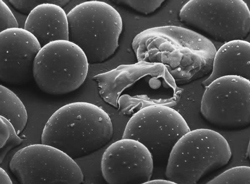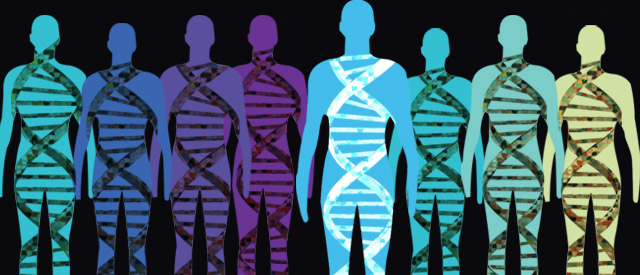According the New England Journal of Medicine (NEJM), malaria affects 225 million people across the globe every year, killing over 781,000 people, mainly African children. Even though the morbidity rate of malaria has been reduced due to scale ups in malaria-control-interventions in recent years, the danger malaria poses to public health remains at the forefront of concerns throughout the globe.
The World Health Organization says malaria is caused by a parasite of the genera Plasmodium and is transmitted intravenously from the mosquito bite on the integument to the liver, where the erythrocytes (red blood cells) are infected. Common symptoms include fever, headache, and vomiting. If left untreated, malaria can become life-threatening by severely disrupting blood supply to the organs.
On October 18, preliminary results published in the NEJM of a phase three clinical trial in Africa provided hope to millions that a new vaccine for malaria may finally have been synthesized. The vaccine, created by GlaxoSmithKline (GSK) and PATH Malaria Vaccine Initiative, is called RTS,S and has been in development for more than 25 years with support from the Bill and Melinda Gates Foundation.
Prior phase two trials have shown that the RTS,S vaccine that targets the circumsporozoite protein with an adjuvant system (AS01 or AS02) has protected against the Plasmodium falciparum malaria in infants and young children.
In vaccination, an antigenic material (a weakened form of a pathogen) is introduced to the body, causing an immune response without causing a disease. The immune system then develops antibodies that attack and destroy the foreign pathogen. Afterwards, the antibodies circulate in the bloodstream and actually “remember” the pathogen so that if the antibodies ever come into contact with it again, the real pathogen would be neutralized by the trained antibodies.
In synergy with the antigens within vaccines, adjuvant systems such as the AS01 developed by GSK optimize the interactions of the vaccine with the immune system to elicit an enhanced and better targeted immune response.
In the double blind phase three clinical trial for the malaria vaccine, there were 15,460 participants enrolled in the study, including 6537 infants six to 12 weeks of age and 8293 children five to 17 months of age at the time of the first vaccination, according to the NEJM publication.
The first 6,000 children in the older age group showed during 12 months of follow-up the first episode of malaria meeting the primary case definition as 0.44 per person-year in the RTS,S/AS01 group and as 0.83 per person-year in the control group, yielding a vaccine efficacy of 55.8%. Further analysis showed that for this age group, the vaccine efficacy against all clinical malaria episodes was 55.1%.
Michael Minkin, senior health studies major, said, “It’s nowhere near effective, but at least it’s a start. I would like to see its effectiveness increase to 80% before it goes out publicly. Since malaria can change forms, its effectiveness would probably decrease over time.”
Sam Broadbent, sophomore chemistry major, said, “While the perfect vaccine for malaria has not yet been found, it is evident that the knowledge to combat against it is growing rapidly. It is now only a matter of time until the vaccine is able to go from curing 47 percent of those with malaria to a 90 percent cure rate.”
Genevieve Fasano, sophomore biology major, said, “It’s amazing to see what modern medicine can bring these days. However, as more and more drugs are developed to combat disease, there will always be concerns about the so called evolutionary arms race between humans and diseases. If the parasite continues to evolve to resist the drugs we create, can we ever really design treatments that are truly effective?”
Michael Minkin, senior health studies major, said, “It’s nowhere near effective, but at least it’s a start. I would like to see its effectiveness increase to 80 percent before it goes out publicly. Since malaria can change forms, its effectiveness would probably decrease over time.”
Dr. Mary Hamel of the U.S. Centers for Disease Control and Prevention, one of the principal investigators in the study, said, “Scientists have been working to develop a malaria vaccine for 40 years, and these findings show that we are on track in the development of a vaccine for African children, those who need it most.”
The RTS,S/A01 vaccine is specifically developed for children because their immune systems still have plasticity allowing them to continue developing; the lack of complete development therefore makes them extremely susceptible to disease.
According to CNN, Dr. Louis Macareo, who directs Walter Reed’s clinical trial center in Kombewa, says this vaccine is different because instead of attacking the parasite, it seeks to boost the immune system. “When you get malaria, it spawns off a cascade of events in your body where your body produces antibodies that fight against the malaria,” he said. “What we try to duplicate with the vaccine is to stimulate the body’s immune system to produce similar antibodies.”
Even though the clinical trials resulted in an efficacy of only about 50%, this vaccine can still help millions of people, despite the viewpoint which the field’s most pessimistic experts, according to the New York Times, hold: “making a long lasting vaccine is impossible because even the ‘perfect natural vaccine’ – surviving repeated bouts of malaria – fades after a few years from the malarial area.”
Andrew Witty, CEO of GSK, noted that his company does not intend to make a profit, going on to say that GSK has spent $300 million to develop RTS,S and will provide the vaccine at five percent above the cost of production and reinvest the excess amount for research into the next malaria vaccine.
Today, society stares at the pendulum of medicine as it rocks with reverberating chords of socioeconomic factors, directly shaping the future well being of our species – all stemmed from a common root of asking, “Why” which remains to this day, the heart of all progression in science.
PHOTO COURTESY of nationalgeographic.com


